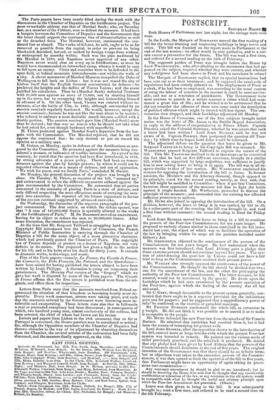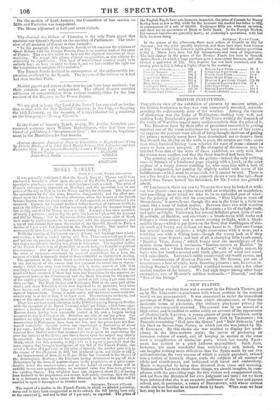POSTSCRIPT.
SATURDAY NIGHTIE' th Houses of Parliament met last night, but the sittings were soon over, In the Lords, the Marquis of NORMANDY moved the first reading of a bill for the better draining and improving buildings in large towns and cities. This bill was founded on the report made to Parliament at the end of the last session : its effect would be only palliative, and to a cer- tain extent a preventive for the future, The bill was read a first time, and ordered for a second reading on the 12th of February.
The supposed pardon of Frost was brought before the House by Lord WHARNCLIFFE ; who, after alluding to the statements that bad ap- peared on the subject, inquired whether they were correct, and whether any indulgence had been shown to Frost and his associates in crime?
The Marquis of NORMANDY replied, that no special instructions had been sent out as to their treatment ; and he supposed the usual code of regulations had been strictly adhered to. The employment of Frost as a clerk, if be had been so employed, was according to the usual custom of using the labour of convicts in the manner it could be most service- able, and not as a remission of punishment. The Government were most anxious to punish in a severe manner a crime which had occa- sioned a great loss of life ; and he wished it to be understood that he did not consider the offences of those men came under the description of political offences which might be treated with less rigour. The con- versation then dropped, and their Lordships adjourned till Monday.
In the House of Commons, one of the first subjects brought under notice was the letter of Mr. Anson to the Dublin Repeal Association, in reply to the address of congratulation to Prince Albert. Captain POLHILL asked the Colonial Secretary, whether he was aware that such a letter had been written ? Lord JOHN RUSSELL said he was not aware of it. Captain Pommx, then postponed the question till Tues- day ; by which time he hoped Lord John would be informed. The adjourned debate on the question that leave be given to Mr. Sergeant TALFOURD to bring in his Copyright Bill was resumed. Mr. WARBURTON pressed Sergeant Talfourd to explain the nature of the bill. This Mr. TALFOURD declined to do at that stage ; as he conceived the fact that he had, on five different occasions, brought in a similar bill, which was supported by large majorities, was sufficient to justify him in now asking leave to bring it in again. The bill was in all re- spects similar to that of last session. Mr. WARBURTON explained his reasons for opposing the introduction of the bill in limine. In former sessions, the Ministers and the Attorney-General, though opposed to its principle, voted for the second reading, merely, as they said, that the bill might be modified in Committee : when it got into Committee, however, those opponents of the measure left him to fight the battle against it single-handed. Mr. Warburton, proceeded to discuss the principle of the measure ; and contended that the existing law afforded sufficient protection to authors.
Mr. HOME also joined in opposing the introduction of the bill. On a division, however, the leave to bring it in was carried, by 192 to 30. In a subsequent part of the evening, the bill was brought in, and read a first time without comment : the second reading is fixed for Friday next.
Lord JOHN RUSSELL moved for leave to bring in a bill to continue the powers of the Poor-law Commissioners for ten years longer. He proposed to embody clauses similar to those contained in the bill intro- duced last year, the object of which was to facilitate the operation of the law by bringing within its scope all the parishes included under Gilbert's Act.
Mr. Getamorren objected to the continuance of the powers of the Commissioners for ten years longer. He had understood when the measure was first introduced, that Lord Althorp gave a pledge that those extreme powers should not continue beyond five years. The sys- tem of administering the poor-law by Unions could not have a fair trial so long as the Commissioners retained their present power.
Mr. WAKLEY also strongly opposed the continuance of the power of the Commissioners. He thought the bill should be divided into two ; one for the amendment of the law, and the other for prolongine-p the authority of the Poor-law Commissioners. The latter measure, he felt assured, would not be sanctioned by the people] He dwelt upon the hardships which he had seen occasioned by the present operation of the Poor-law, against which the feeling of the country was all but universal.
Sir C. GREY, though favourable to the present system generally, con- tended that there ought to be a separate provision for the industrious poor and for paupers; and he suggested that a supplenientary power of relief be conferred on the vestries or parochial meetings. Sir FRANCIS BURDETT condemned the whole bill, as erroneous in principle. He did not think it was possible so to amend it as to make it acceptable to the people. Mr. Hums defended the new Poor-law from the attacks of Sir Francis Burdett. He admitted that hardships had resulted from it, but it had been the means of remedying far greater evils.
Lord Joust RUSSELL, after the opposition shown to the introduction of the bill, entered more at large into the evils which the present Poor-law system was intended to remedy. He pointed out the vicious mode of relief previously practised, and the mischiefs it produced. He denied that any pledge had been given by Lord Althorp that the powers of the Commissioners should determine at the end of five years. The original intention of the Government was that there should be no definite term; but as objections were taken to the extensive powers of the Commis- sioners, it was then agreed to limit the operation of the bill to five years, that Parliament might have an opportunity of again taking its provi- sions into consideration— Any necessary amendment be should be glad to see introduced; but be should be deceiving the House Wile said that be thought that any considerable modification or relaxation of the law, or any reversion to the old system, would be compatible with what he thought the useful and salutary principle upon which the Poor-law Amendment Act proceeded. (Cheers.)
Leave was then given to bring in the bill. It was subsequently brought in ; read a first time, and ordered to be read a second time on the 8th February.
On the motion of Lord ASHLEY, the Committee of last session on Mills and Factories was reappointed.
The. House adjourned at half-past seven o'clock.



























 Previous page
Previous page